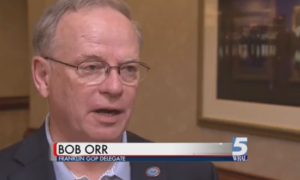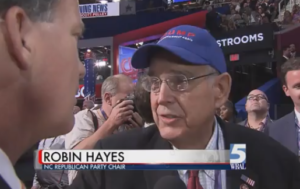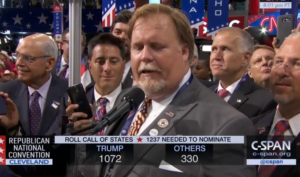The Rise Of The Shadow Convention: After Being Evicted From The 2016 RNC, Bob Orr Plans His Own

ARENA
Four years ago, a delegate at the Republican National Convention said this: “I cannot vote for Donald Trump, either for the nomination or in November.”
That was former North Carolina Supreme Court justice Robert Orr, who attended the 2016 RNC in Cleveland as a delegate for former Ohio Gov. John Kasich.
That comment led him to be kicked out of the Cleveland convention – and led him to plan a “shadow convention” of Never Trump Republicans that may run alongside the RNC in Charlotte in August.
“You know, I tell folks my first presidential ballot was for Richard Nixon,” Orr said in an interview. “I voted for every Republican running for president up until Trump. I hung with Nixon until the end on Watergate.”
Today Orr is retired, but teaches a weekly class on the North Carolina state constitution at the UNC School of Law in Chapel Hill, where he graduated in the early 1970s.
He said he noticed the Republican Party was moving to the right during his run for governor 12 years ago (he lost in the Republican primary to Pat McCrory), and then again with the Tea Party movement in 2010.
And when Trump began his rise, Orr was appalled — mostly by the president’s character. And when Trump first came on the scene, he was convinced he was going to flame out after he insulted John McCain in the summer of 2015.
Trump said McCain was only a war hero because he was captured.
“To me it was so over-the-top in disrespecting not just Sen. McCain but the service of all the people who have served in the military, suffered and the like,” Orr said. “And there were no consequences to it? I think at that point I said, ‘This is insane, this should have completely ended any chance this man has of holding any elected office.’”
During the Republican primaries, Orr supported Kasich. And the state Republican Party picked him to be a Kasich delegate for the RNC.
Kasich was the last candidate standing in opposition to Trump. Texas Sen. Ted Cruz dropped out May 3, 2016 and then Kasich quit a day later.
Orr said he went to the 2016 Republican National Convention in Cleveland thinking there might be a way to stop Trump. He thought that a combination of Kasich, Rubio and Cruz delegates – along with establishment Republicans – might band together to deny Trump the nomination.
There was a brief uprising. A group of delegates attempted to force a roll-call vote to change convention rules in an effort to release some of Trump’s delegates, so they could vote for other candidates.
Orr said he realized quickly that Trump was going to get the nomination.
“Once I got there it was like, ‘This train is running,’” he said. “If you are on the tracks you are going to get run over.”
But on the first day of the RNC, Orr agreed to give an interview with Cullen Browder of WRAL in Raleigh.

“I can not vote for Donald Trump, either for the nomination or in November,” Orr said.
Browder asked why.
“I think he’s singularly unqualified to lead this country.”
That interview caught the attention of the state’s top Republicans, who acted swiftly.
“And as soon as that aired back in North Carolina, the credentials got pulled,” Orr said.
He said he went back to his hotel room.
“I’m checking emails and here’s an email, I think it’s from (former GOP state executive director) Dallas Woodhouse, saying, ‘Your credentials are being held. You need to talk to the chairman, here’s his phone number,’” he said.
The chairman of the state GOP then was Robin Hayes. Two years after the RNC, Hayes was caught up in the FBI’s investigation of Durham businessman Greg Lindberg, whose trial concluded this week in federal court in Charlotte.
Lindberg is accused of trying to bribe the state insurance commissioner, and Hayes was allegedly part of the scheme.
Hayes pleaded guilty last fall to lying to the FBI. He hasn’t been sentenced yet.
In the same news story on WRAL, Browder also interviewed Hayes, who said it’s OK for delegates to have a difference of opinion.
“This is something that we encourage (for) Republicans to have a voice, stand up for what they believe,” Hayes said. “We have a number of people who are very strong supporters for other candidates.”

But Hayes took action.
“It was pretty clear that I wasn’t going to get the credentials back if I didn’t make some sort of 180 and say, ‘Well I’ll support Trump,’” Orr said.
As a Kasich delegate, Orr said he would be allowed, or expected, to vote for Kasich on the first ballot.
And Orr wasn’t alone. There were North Carolina Cruz delegates who also got sideways with Robin Hayes.
In his convention speech, Cruz told delegates to “Stand, and speak and vote your conscience. Vote for candidates up and down the ticket who you trust to defend our freedom and to be faithful to the Constitution.”
Orr said Hayes asked two North Carolina Cruz delegates what they thought of the speech.
“And they said, ‘Yeah we agreed with him,’” Orr said. “And Hayes told them, ‘Well, they’ll have to find other transportation back to North Carolina because you’re not flying back on my plane.’”
Orr said the decision to throw him out was wrong – and dangerous.
“And that really is in a lot of ways the scariest part — is the mindset that you better be with us, or you are out,” he said. “I mean, there is no room for legitimate dissent. And we’ve seen – not just my small incident at the convention but the way the Senate and other elected officials have just completely folded and gone along in so many different ways with things that I know they know are wrong — but it’s this, ‘If you’re not 100% with us, you are 100% against us.’ Which is terrible government. It’s dangerous to the party. It’s dangerous for the Democrats.”

Orr said he doesn’t have any contact with the leaders in the GOP, except when they have asked him to un-register as a Republican.
But he refuses to become an unaffiliated voter or a Democrat. And he said he’s planning a shadow convention in Charlotte during the RNC.
“I think it’s important,” Orr said. “What I have to do is find those people with a national presence who are willing to say, ‘Yeah we are going to invest some time and money into this so the world knows that Trumpism isn’t what we believe in.’ ”
But it’s unclear if the so-called shadow convention will work. Some of the state’s establishment Republicans aren’t ready yet to sign on, like former Charlotte Mayor Richard Vinroot. He said earlier this week that Trump isn’t his favorite – but that he wouldn’t attend any protest.
“You really are homeless politically, and so therefore it becomes difficult to pull together the financial resources, the logistical resources, to say, ‘OK, we’re going to have 1,000 anti-Trump Republicans from across the country show up in the vicinity of Charlotte,’” Orr said.
But he added: “Even if it’s just one or two of us standing up, you gotta do it. I mean I just think it’s too important.”
Orr may be getting some help from Washington D.C.
Evan McMullin is a former CIA officer who ran as a third-party candidate in 2016, and got more than 20% of the vote in his home state of Utah. He said this week that he and his group – Stand Up Republic – have been in touch with Orr about a secondary convention during the RNC.
Orr also addressed a question that the city of Charlotte has wrestled with.
Should the city of Charlotte have agreed to host the convention?
“No,” Orr said. “I think they made the wrong call. I think it will ultimately not serve the city of Charlotte and the state of North Carolina well to have the RNC convention there in 2020.”
He continued: “I mean, is that really the message that we want broadcast from Charlotte, North Carolina, to the world over the course of three of four days? And it will be vitriolic. I mean, that’s his modus operandi. That’s the wrong message for the state, it’s the wrong message for the country and it’s the wrong message to the world. I just regret that Charlotte is going to be tainted with that message.”
Click here to subscribe to the Inside Politics podcast (and to give the podcast a rating/review in your favorite podcast app).
Want more? You can sign up here for our weekly Inside Politics newsletter, written by Steve Harrison.
Have a question about the 2020 RNC in Charlotte? Ask us below.